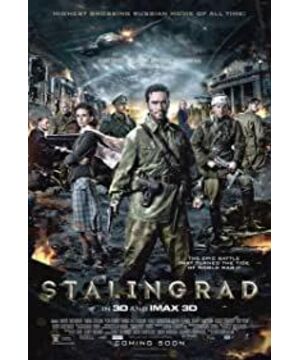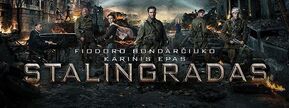In 1942, on the battlefield of Stalingrad, the Soviet and German armies faced each other across the Volga River. After the Soviet army's offensive attempt to retake the beachhead on the other side of the river was frustrated, the scattered Soviet troops retreated to the heroine Kajia's house and formed a small group. The force continues to resist the German army, and the story begins...
Although the film is named "Stalingrad", compared with the famous tragic battle, it is only used as the background of the story, and does not show much of the Soviet Union. The tactical and strategic scenes of large-scale battles at the army level of the two sides of Germany, and the main perspective is in a building on the Volga River, and the battle scenes are mostly close-to-hand-to-hand street battles, so this war history film has more trends. The route of the literary film. For military fans who want to watch the epic of the grand war, the format of this film is slightly smaller, and the viewing experience may not feel very enjoyable. From my personal experience, this film is actually more like a book. After telling the whole story in a eloquent way, the process is full of depression and heavy emotional accumulation, and everything to be expressed is left to the audience. In retrospect and reflection after reading it...
Honor - The German captain with a strong sense of honor is almost a model of an excellent soldier: brave, courageous, fearless, and always at the forefront. The war in his eyes is more like a competition of courage and ability. He wants to win, but also to win beautifully, win glory, and win to convince his opponents. The Russian soldiers in his mouth "have no sense of honor. They only shoot black guns and fight for revenge. You people are not worthy of fighting against me!" combine. The Russian captain objected to snipers shooting unsuspecting German soldiers during non-combat hours. He also realized that the presence of the heroine would make his soldiers emotionally emotional and rational, and tried to persuade her to leave.
Revenge—actually, after witnessing the brutal burning of innocent civilians by the Germans, the Russian captain angrily ordered a risky attack. The German captain has always looked down on the Russian army's fight for revenge. After the woman he cared about was shot and killed, he resolutely turned the final attack into a personal vengeance. Holding the huge weapon advantage of a tank battalion, he could have razed the building directly, but he still chose the assault attack after the shelling, and rushed into the room like a lunatic looking for the Russian captain to complete the swordsman-style attack. showdown. In terms of tactical strategy, rational use can be closer to winning at the least cost. However, war can make all those involved in it lose their rationality and principle.
Mission - Why Join the Army? The answers are different: some are for honor, some are for revenge for their deceased relatives, and some may be coerced... Different people come to the battlefield with different purposes just to do the same thing- Killing - to kill the enemy on the opposite side, sometimes you need to kill your own people, and you may even kill those who are completely innocent.
Survival - Innocent civilians are the biggest victims of war, and they are irresistibly drawn into it, displaced and destroyed. To live has become the humblest and only remaining belief.
Sacrifice - obeying orders is the duty of a soldier. Once you join the army and join the battlefield, it means you have to give everything, including your life, to complete the execution of the order. Unlike civilians, survival, for soldiers, is something that can be lost at any time.
War - what is war? The war was a building on the Volga River. The Soviet and German armies left countless corpses for fighting for it. In the end, no one could get this building.
Quoting a line from the film to end - thanks to our parents, we still don't know what war is.
View more about Stalingrad reviews











